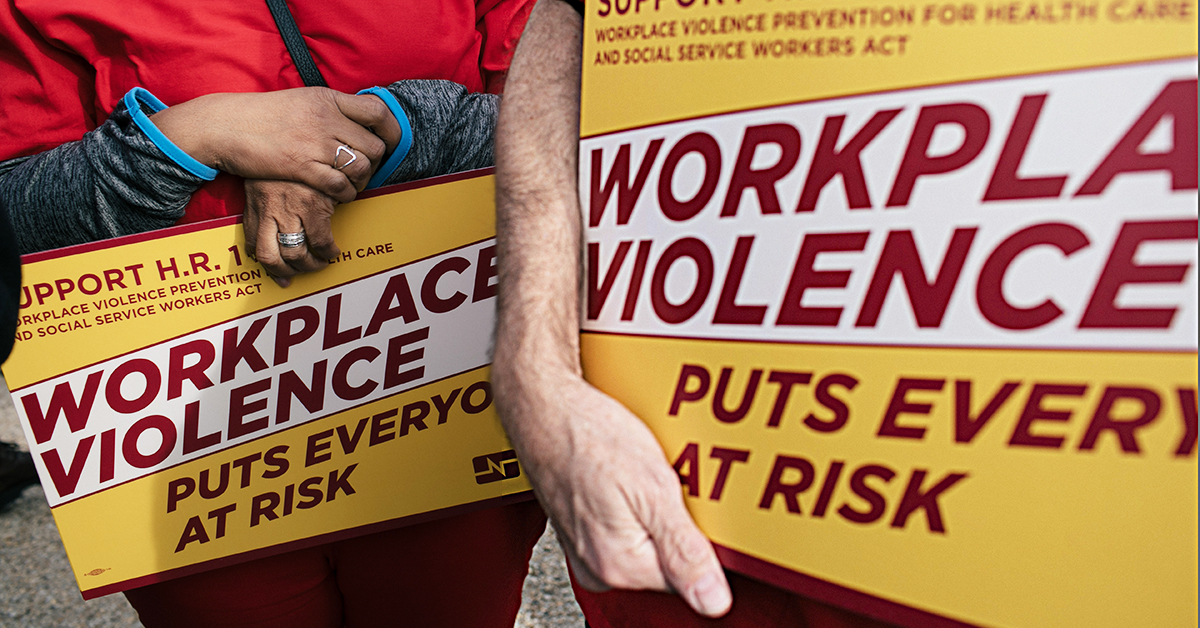Press Release
NNU Applauds House Committee Vote to Advance Bill Protecting Health Care, Social Service Workers from Epidemic of Workplace Violence

House Education and Labor Committee approves Workplace Violence Prevention for Health Care and Social Service Workers Act for full House floor vote
National Nurses United (NNU) applauds the U.S. House Education and Labor Committee’s approval of the Workplace Violence Prevention for Health Care and Social Service Workers Act (H.R. 1195), federal legislation that would help stem an epidemic of threats and assaults facing frontline health workers before and during the Covid-19 pandemic.
The panel’s vote today advances the bill out of committee, setting up the legislation for full House floor consideration. The federal legislation, which passed the House in the 116th Congress and was reintroduced this session by U.S. Rep. Joe Courtney (CT-2), would mandate that the U.S. Occupational Safety and Health Administration (OSHA) create a national standard requiring health care and social service employers to develop and implement a comprehensive workplace violence prevention plan.
“These protections are long overdue for the scores of registered nurses and other health care workers who are on the front lines,” said Jean Ross, RN and a president of NNU. “We deserve the support and protections that will enable us to focus on the care of patients, especially during one of the deadliest pandemics of our lifetime. Our nurses and social service workers are facing enough stress during this pandemic.”
“This is a huge step forward in the fight to get this important federal legislation signed into law. In 2019, health care and social service workers reported five times the rate of injuries due to workplace violence than workers overall,” said Zenei Triunfo-Cortez, RN and a president of NNU. “Many employers have failed to provide the necessary protections, so it’s up to lawmakers to pass this important legislation and give us what we have long deserved in the workplace.”
The frequency and severity of workplace violence incidents in health care and social service workplaces was already devastatingly high before the Covid-19 pandemic began, and this has only worsened over the course of the pandemic. A recent NNU survey found that 22 percent of nurses reported facing increased workplace violence on the job since the beginning of the pandemic, which they attribute to decreasing staffing levels, changes in the patient population, and visitor restrictions.
Today’s House committee approval of the federal legislation comes just days after its Workforce Protections subcommittee heard testimony from Pascaline Muhindura, an RN in the critical care unit at Research Medical Center in Kansas City, Mo. She described the urgent need for OSHA to issue a Workplace Violence Prevention Standard. Muhindura credited NNU for negotiating for collective bargaining agreements with provisions that address workplace protections for its members.
More specifics of Rep. Courtney’s federal legislation:
- Addresses an epidemic of violence: Workers in the health care and social assistance industry face extremely high rates of workplace violence. Between 2011 and 2016, as reported in the U.S. Bureau of Labor Statistics Census of Fatal Occupational Injuries, at least 58 hospital workers died as a result of violence in their workplaces. In 2016, the Government Accountability Office found that health care workers at inpatient facilities were 5 to 12 times more likely to experience nonfatal workplace violence than workers overall.
- Requires federal OSHA to create a federal workplace violence prevention standard mandating employers develop comprehensive, workplace-specific plans to prevent violence before it happens.
- Covers a wide variety of workplaces, including hospitals, residential treatment facilities, non-residential treatment settings, medical treatment or social service settings in correctional or detention facilities, psychiatric treatment facilities, substance use disorder treatment centers, community care settings such as group homes and mental health clinics, and federal health care facilities such as those operated by the Veterans Administration and the Indian Health Service, as well as field work settings such as home care and home-based hospice, and emergency services and transport services.
- Sets a quick timeline on implementation to ensure timely protection for healthcare workers.
- Sets minimum requirements for the standard and for employers’ workplace violence prevention plans, based on the groundbreaking California legislation. These requirements include unit-specific assessments and implementation of prevention measures, including physical changes to the environment, staffing for patient care and security, employee involvement in all steps of the plan, hands-on training, robust record keeping requirements including a violent incident log, protections for employees to report WPV to their employer and law enforcement, among other requirements.
The federal legislation follows the adoption by California OSHA of a groundbreaking health care workplace violence standard that was the result of state legislation sponsored by the California Nurses Association/National Nurses United.
National Nurses United is the largest and fastest-growing union and professional association of registered nurses in the United States, with more than 170,000 members nationwide.